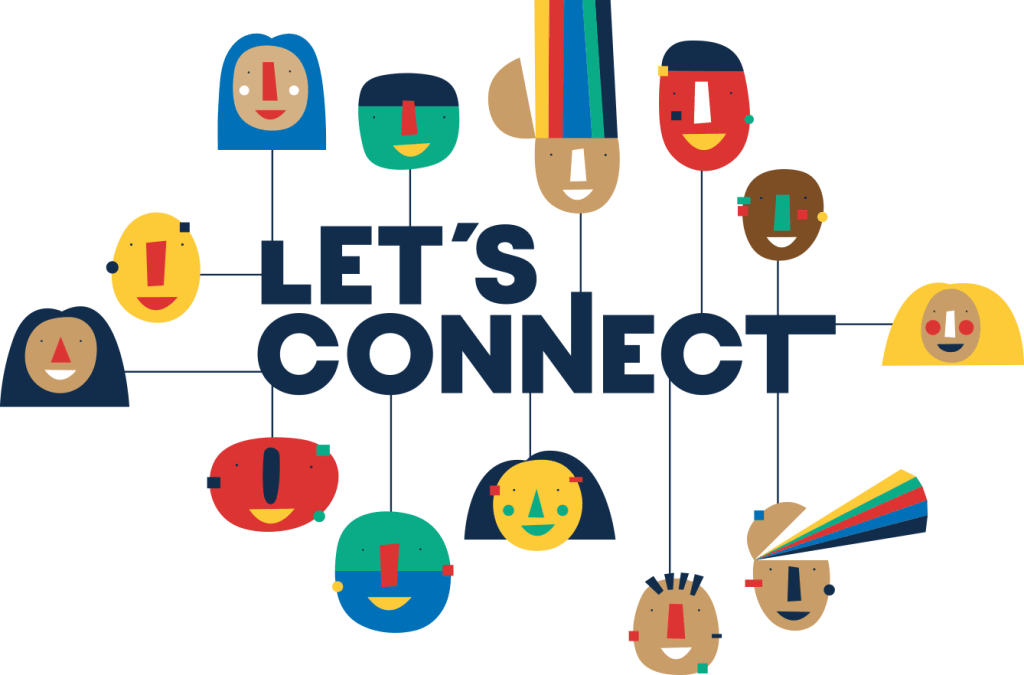
The Community Resources team and the Community Working Group are excited to announce the launch of the Peer Learning Program – Let’s Connect.
Let’s Connect – is a response to requests gathered during the Movement Strategy process and the grant relaunch consultation, for support beyond funding and building capacities through knowledge sharing amongst community members – their peers and colleagues. It is aligned with the shared Movement Strategy principles of people-centeredness, collaboration and cooperation.
The initial Let’s Connect design was the result of a participatory process, with more than 40 community and Foundation staff members invited to brainstorm around the Let’s Connect’s focus and strategies.¹ A special thanks to all of you for co-creating this and being actively involved in its roll-out!
Centered on people and human connections.
Let’s Connect creates spaces for horizontal, flexible and interactive peer learning spaces and resources.² It is directed at Wikimedians in all regions that are part of “organised groups” (this can range from a group of individuals that are not formally organised, user group, chapters, and mission-aligned organisations), seeking to share their knowledge and learn from others. They can be those that receive funding from Wikimedia Funds, or could potentially do so in the future.
Let’s Connect will encourage a Learning Culture that is inclusive, based on the notion that: we all have something of value to share – given the information to connect, the right spaces and logistical support. Let’s Connect encourages curiosity and honest reflection, learning about good practices, but valuing what didn’t work out as expected – the surprises, the “failures”. It encourages learning that is adaptable and flexible to different contexts, levels of development, and needs.
How will Let’s Connect work?
Let’s Connect is composed of two main learning spaces,
1. Learning Clinics for monthly live connections between groups of around 20 participants. These will be regionally based or cross-regional and be collectively defined around topics of interest, case studies and Wikimedia funding cycles.
2. One-on-one matches between community members to share during live virtual conversation (coffee/teas), opening the door for further resource sharing and mentoring. These happen on a continuous basis with connections being made directly by participants and proposed by the Let’s Connect working group.
There are three support elements so that these spaces can work.
1) Skills Directory: a general database that identifies skills and sharing interests amongst community members that forms the basis for the “matching”.
2) Resource centre: a very basic space on Meta for sharing any material associated with the learning spaces – video recording, guidelines, documents, references, decks.
3) Connections: informing and connecting participants to existing spaces within the Movement. These spaces vary in each region and around different topics or programs, such as communities of practices, periodic meetings, training, events, etc. One important source of information and connection will be the Movement’s community calendar.
Around what topics?
Some of the common topics that have come up in brainstorming sessions are around a. organizational and funding-related issues (such as writing proposals, qualitative evaluation to tell impact stories, staffing issues, volunteer retention), b. programmatic tactics (such as innovative approaches to training newcomers and good or innovative practices in areas such as culture & heritage, education), as well as discovering different c. Wikimedia project-related tools.
Let’s Connect learning spaces and resources seek to create initial connections around key issues, tools, approaches, and interesting cases, that will open opportunities for further learning and practice.
How can communities participate?
Community members can register as a. Sharers: the main participants who will be community members engaging in the spaces to share their knowledge and experiences and learn from others, b. Let’s Connect Learning ambassadors: these are community members that would help to organise learning spaces in their region or around topics of interest and access financial and logistical support to do so. In March, an invite will be sent out for everyone to register.
How can staff members participate?
By actively communicating Let’s Connect to the community members they work with, linking the program to existing learning and training spaces, and participating as peer sharers in learning spaces.
Incentives and support
The Foundation, through the Community Resources team, will support the Let’s Connect by providing logistical support and offering services to facilitate inclusive participation: interpretation and translation, financial support, methodological support, and guidance, amongst others.
Apart from the incentive to mutual support and share with others, Let’s Connect will also include certifications of participation and financial support for participants based on need and levels of participation.
When?
Let’s Connect will be implemented as a joint Foundation-Community effort, with some community members being involved in an initial Working Group in an advisory role and as part of the operational team. For those interested in learning more about the group please reach out to Jessica Stephenson at jstephenson@wikimedia.org.
The initial pilot phase will begin in March through to July to learn, iterate and adapt for future phases. For a summary of Let’s Connect, you can view this deck!
Keep your eyes open for the invite to register in March!
1. Staff: from Movement Communications, Community Development, Community Programs, Talent and Culture, GDI. Community members: included volunteers and also representatives from some affiliates from Germany, Morocco, Bangladesh, France, Netherlands, Sweden, Nigeria, Ghana, Kenya, Bolivia, Mexico, Argentina, Malaysia, and representatives from Women in Red, Art+Feminism, and Wiki In Africa.
2. Peer learning is one of many collaborative forms of learning. It differs from formal training, which generally seeks to build and transfer knowledge in a structured and more formal setting. Peer learning can complement and not replace formal training.

Can you help us translate this article?
In order for this article to reach as many people as possible we would like your help. Can you translate this article to get the message out?
Start translation